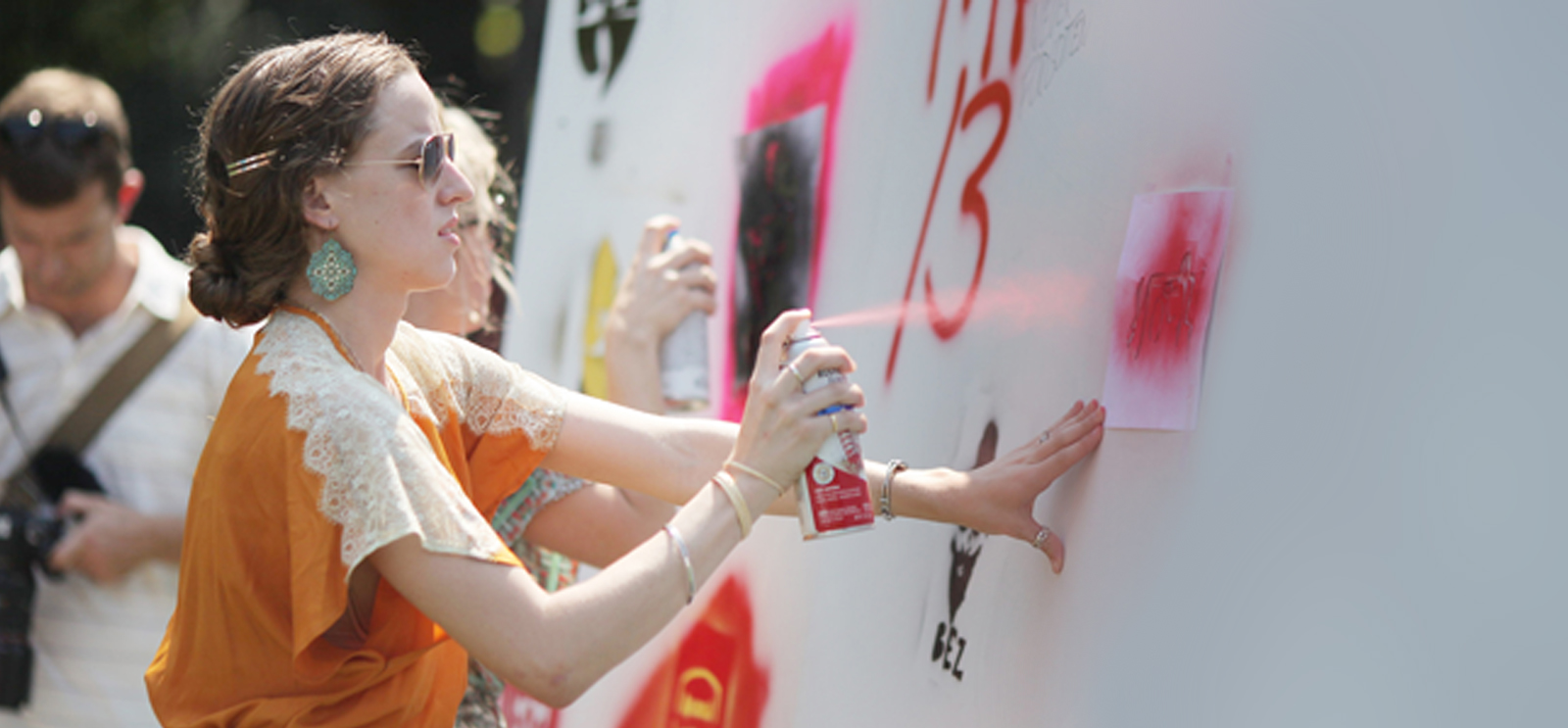
Elizabeth Bedi contributed to the graffiti wall that honored her husband. (Photo courtesy Darko Bandic/Associated Press)
Mandeep Bedi, AB’10, who died trying to help his injured wife, left a colorful legacy.
Elizabeth Bedi examined a half-graffitied wall before using red spray-paint to recreate the tattoo that decorates her upper back—the name of her husband, Mandeep, written in Punjabi. Mandeep Bedi died August 25 from injuries sustained during a traffic incident a week earlier; September 1 on Bartlett Quad, friends gathered to decorate the wall, in honor of his senior thesis on American graffiti.
Elizabeth, a College fourth-year, and Mandeep, a sales intern at the University’s IT Services Solutions Center, were driving to campus August 19. It’s unclear exactly how circumstances unfolded, but according to the Chicago Tribune, after Elizabeth turned onto Garfield Boulevard, she got into an argument with the female driver of another car, who pulled up alongside the couple. Both cars stopped, and Elizabeth and Mandeep got out. The altercation ended with the woman backing into Elizabeth, who was not seriously hurt, and driving forward over Mandeep, who died from his injuries the following week. The woman fled the scene, and the Chicago Police Department is investigating Mandeep’s death as a homicide.
In invitations to the memorial service, Elizabeth asked attendees to put the details of the accident and investigation aside for the day and focus on Mandeep’s life. She worked with campus administrators to plan the remembrances. After almost three hours of spray-painting while Mandeep’s iPod blasted hip-hop music in the background, the graffiti wall took full form. Images of Mandeep overlapped the logo of his favorite soccer team, Arsenal, and his signature phrase, B.E.Z. (“be easy”).
The group then moved to Rockefeller Chapel, where the 150 attendees wore white and bright-colored clothing, traditional for Sikh funerals. The graffiti wall stood on Rockefeller’s chancel, surrounded by flowers and photographs of the Bedis. Elizabeth spoke about her life with Mandeep, whom she had known for only 17 months. The two met at an off-campus party and married just a few months later on May 7, 2010. “We were selfish,” Elizabeth said, “but I thank God that we were.”
Tara Treaster, Elizabeth’s mother, told the crowd that it was hard at first to accept that her daughter married so young and so quickly, but seeing them happy made that acceptance easier. Friends too were initially surprised. Mandeep’s best man Matthias Dean-Carpentier, SB’10, said, “Asking Mandeep about his reasoning for his course of action was like talking to a jukebox: only happy music came out.”
While he was a student, Mandeep was active in the South Asian Student Association’s dance group, taught high schoolers through the student-run organization Splash! Chicago, and was a residential computing assistant.
Dean-Carpentier also recalled the time someone called campus security to report a “suspicious person.” It turned out to be Mandeep, walking around on an 80-degree day in the puffy black winter coat he wore everywhere. Mandeep had no problem explaining himself to the officer: he was just a thin man and constantly cold. “Mandeep had a way with words,” Dean-Carpentier said. “He never said anything simply, but by the end of it you had his thesis and more points of evidence than you’d need.”
